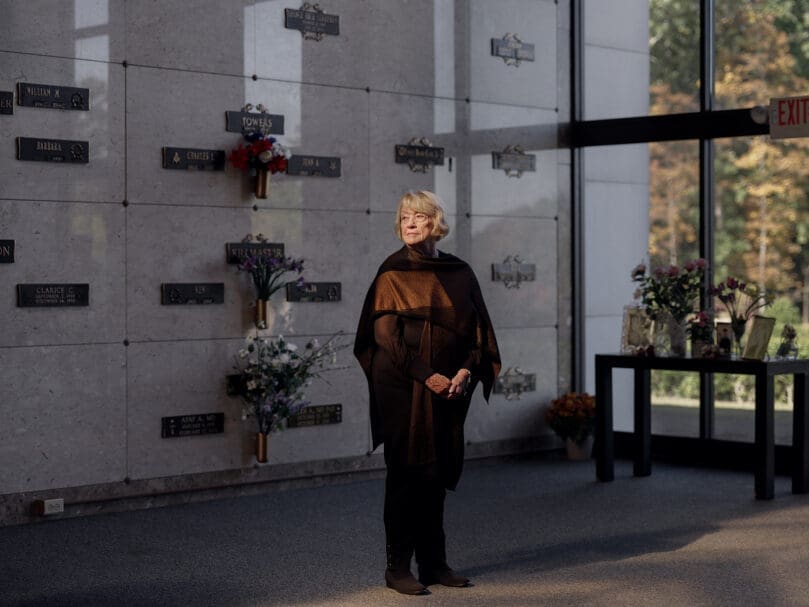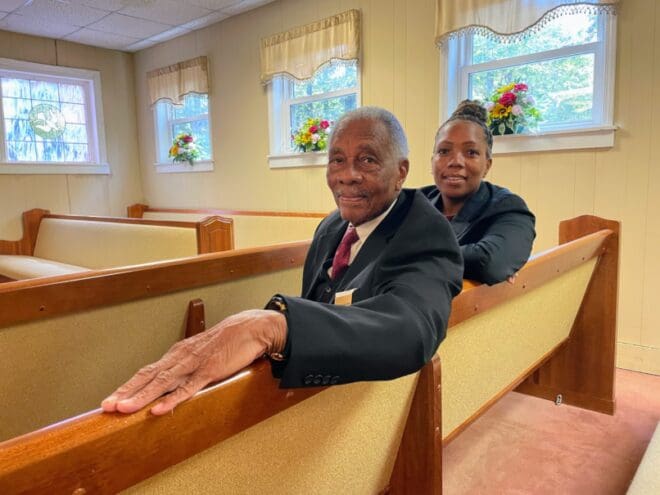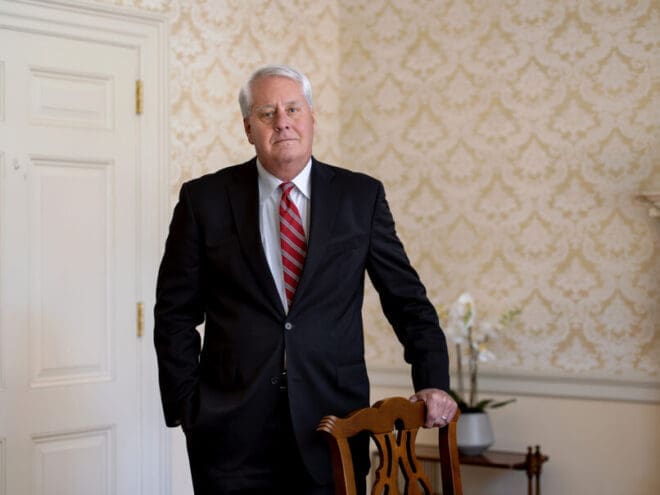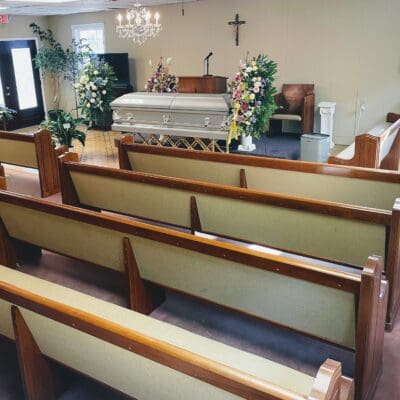 Photo by Johnathon Kelso
Photo by Johnathon KelsoFayetteville
Aiding people on their worst day, funeral workers serve others’ needs
By ANDREW NELSON, Staff Writer | Published October 27, 2022
FAYETTEVILLE—Herman Griner prepared a hearse on a recent Friday. It carried large floral arrangements and the casket of a military veteran for the journey from his H. Griner Funeral Home to a Methodist Church in southwest Atlanta.
Organizing what he calls “homegoing” services is a ministry to others, said Griner, a longtime member of St. Anthony of Padua Church, Atlanta. The family’s needs always come first.
“I like to remember the people I’m serving is what I went through,” said Griner, who buried his wife two years ago.
“I’ve had close relatives come to death, a father, my sister, my mother,” he said.
November brings special days of remembrance for the church’s beloved dead, called All Saints’ Day, a holy day of obligation, followed by All Souls’ Day. A place of honor is set aside in some parishes for photos of deceased members and loved ones.

Herman Griner and his daughter Cherye Mercier work together at the H. Griner Funeral Home. He opened the Fayetteville funeral home in 1993, fulfilling what he said was a calling from a young age. Photo by Andrew Nelson
Those who help bury the dead and accompany their grieving families regard their work as a privilege. This work leads to deep relationships with families. It is an opportunity to “help people that most folks will never be able to do,” said Scott Young, who started assisting at funerals nearly 48 years ago while a college student.
Catholic funerals are the culmination of a life of faith. The Catechism of the Catholic Church states, “The Church who, as Mother, has borne the Christian sacramentally in her womb during his earthly pilgrimage, accompanies him at his journey’s end, in order to surrender him ‘into the Father’s hands.’” In faith, the church “commits to the earth, in hope, the seed of the body that will rise in glory.”
In the past five years, there have been an average of 1,600 funerals held annually in churches in the Archdiocese of Atlanta. To keep up with the increasingly popular choice for cremation, more parishes are building memorial gardens and columbaria with niches to place cremains.
The Centers for Disease Control and Prevention count nearly 86,000 deaths annually in Georgia, some 235 people a day.
Many paths to caring for families
The path to funeral work is rarely the same. There are some 1,978 funeral directors licensed by the Georgia Secretary of State. These men and women are trained for tasks such as embalming and making burial arrangements with families.
Young was a college student in Indiana looking for extra spending money when he began working for a funeral home. He expected to drive the limousines, vacuum the carpets and host families and guests during wakes. It quickly become more meaningful.

Scott Young, funeral director, is photographed at H.M. Patterson & Son-Oglethorpe Hill Chapel in Atlanta. He began working at a funeral home as a college student. Photo by Johnathon Kelso
“I would make removals of decedents and bring them into our care. It’s one of those things that as you do it, you begin to get ‘thank you for helping’ somebody with the most difficult time in their life. It became very meaningful to me not necessarily as a Catholic, but as a Christian,” he said.
He got his funeral director license in 1980. Young, 66, is the managing director for Atlanta properties of Dignity Memorial. He worships at St. Jude the Apostle Church, Sandy Springs, since moving to metro Atlanta in 2014.
Maureen David, 79, worked with families pre-planning their services at the 122-acre Arlington Memorial Park. The Sandy Springs cemetery is where Atlanta priests and bishops are laid to rest. It hosts an annual All Souls’ Day Mass. This year it will be Wednesday, Nov. 2 at the cemetery, beginning at 10:30 a.m.
David was a family service counselor for 35 years. She retired four years ago and is a member of St. Brendan the Navigator Church, Cumming.
“I never had any fear factors. Some days were more stressful than others, especially if you were dealing with a child,” said David, who lost her father when she was 12. “Their pain sometimes becomes your pain. I have to put myself in a happy place mentally some days to get through the day.”
Growing up on a farm in rural Georgia, Griner, who said he is in his early 80s, recalled as a youngster organizing funerals for chickens, complete with rose petals. As a high school student, he assisted at funerals. He earned his license in 1968. Before following his dream, he had a decorated career as police officer in Atlanta.
“I joined the police department in 1967. But I kept my license current because I knew what I wanted to do,” he said.
The family operation in Fayetteville will mark its 30th anniversary in early 2023. He is assisted in the office by his daughters Michele Griner-Griffie, Cherye Mercier and Chevon Hill.
COVID upends grieving
When the coronavirus pandemic arrived in the spring of 2020, funeral directors faced an unprecedented task, help hurting families and adhering to public health regulations. For a time, funerals could not be held in churches. Only 10 mourners were allowed at services. Social distancing made one of the essential services of funerals to comfort the bereaved challenging.
“It was devastating, to say the least,” said Young. “People were not able to gather. They couldn’t celebrate collectively.”
He traveled to New York City to help at other funeral homes when it was the epicenter of the virus and hundreds were dying a day. Young helped there for two weeks followed by a two-week quarantine from his family. He called the experience “absolutely mind boggling.”

The chapel at the H. Griner Funeral Home will mark its 30th anniversary next year. Photo by Andrew Nelson
Funeral workers had to devise creative solutions to allow people to mourn. Services were moved to online videos. Audio allowed services to be broadcast a short distance over the radio so people could listen from their car at the cemetery.
The virus killed 33,600 Georgia residents, as of Oct. 12, according to the Georgia Public Health Department. Scientists identified one of the state’s first super-spreader events in 2020 stemming from two funeral homes in South Georgia.
Grieving families felt the hardship. They suddenly had to bury a loved one and limit the guest list for who could attend in person to pay their respects. “They put a strain on the families and we had to deal with the families and make sure that we were safe,” Griner said. “It did seem somewhat unnatural.”
Serving families with needs and traditions
Discovered through the years of work is a thread linking people no matter their station in life. Family and tradition ease the transition as loved ones are buried. Griner remembered how mourners from another country told him it was custom to gather for a month to remember the dead. He opened the funeral home for weeks, so they all could be together.
For Young, his focus is always to be present for families and provide for their needs. He proposes, never imposes.
“My job is still the same and that’s to recognize the wants and desires of a family and then fulfill their wishes,” he said.
Through the inevitable sorrow, David felt connected with families, some who became close friends she still hears from years later.
“I found it fascinating. I found it to be interesting. It’s all about people being with people. You give a lot to help somebody else on the worst day,” she said.
After the service for the veteran, Griner would later drive the remains to its final resting place. It was more than two hours away in Alabama. He would deliver the loved one to another funeral home, before making the trip back to Atlanta. It’s part of the work, following the family’s desire.
“It’s not for everyone to be involved with, day to day, dealing with death and families,” he said.